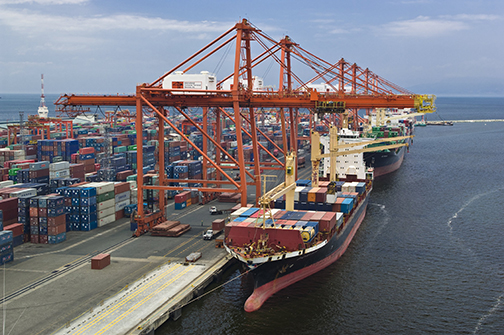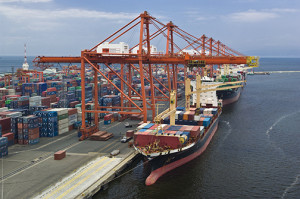

President Benigno Aquino III is calling on the private sector to reciprocate efforts by the government to decongest Manila ports.
“The issue of port congestion has been a paramount concern since the truck ban. We know just how much it has affected, and can affect, the conduct of business in the country,” Aquino said in his speech during the 40th Philippine Business Conference on October 24.
That is why, Aquino said, Cabinet Secretary Rene Almendras, other government agencies, and the private sector “have been working hard to address the issue.”
The Cabinet Cluster on Port Congestion headed by Almendras was formed in June this year to look for ways to address congestion at the ports of Manila, a result of the imposition of the Manila daytime truck ban in February. While the Manila truck ban has been lifted in September, its effects linger. Manila International Container Terminal and Manila South Harbor still report high yard utilization and off-dock container yards continue to operate at capacity.
As for the call to more actively utilize the ports of Subic and Batangas by shifting cargoes there, Aquino pointed out that Executive Order No. 172 has already designated the two ports as extensions of Manila during cases of emergencies, including when there is port congestion.
He pointed out that the cost at these two ports has been cut “to incentivize importers to shift to those ports”, specifically citing the 90% discount in port charges at Batangas.
Moreover, the Philippine National Police has ramped up their operations against hijackers to ensure the safe passage of cargo, according to Aquino. This includes intensified police presence along roads and highways, especially in areas identified to be prone to hijacking.
“The implementation of a pass card system will also allow official personnel at anti-hijacking control points along major truck routes to ensure that drivers and their deliveries of cargo are legitimate, and that they reach their destinations safely,” Aquino explained.
These, according to Aquino, are some of the government measures to “ensure greater efficiency and safety in the conduct of trade.”
He noted improvements, such as high utilization of Batangas port, which shot up to 94% this October, compared with 20% to 25% at the beginning of the year. Ship calls to the port likewise grew from two to five ships per week, Aquino said.
But he acknowledged that diverting traffic to Subic and Batangas ports is only a short-term solution because high utilization rates for both ports “may mean that we run the risk of transferring the problem we encountered in the Port of Manila to those very ports.”
Aquino said that the “more effective solution in addressing the issue of congestion is to continue operations through the weekend.”
He said the Bureau of Customs is already been operating on weekends. And yet, he noted that based on data from the Philippine Ports Authority, few organizations are taking advantage of the weekend window for withdrawals.
“Only an average of 1,100 containers are moved on Sundays, which represent less than a third of the average number of containers moved on other days of the week,” the President pointed out.
“Government can only do so much—our main purpose is to be an enabler. That being the case, solutions require the enabled, in this case the private sector, to reciprocate through active participation.”
Aquino said this is true for other concerns as well, from overcoming the rest of the challenges facing the power sector, preparing for the ASEAN Economic Community, and enhancing the state of infrastructure across the Philippines to ushering in peace and stability in Mindanao.
“Government is implementing measures not only as a reaction to current and pressing events, but more importantly, we are strategizing for the future,” he said. “In each and every endeavor, however, the private sector must likewise do its part.” – Roumina Pablo




